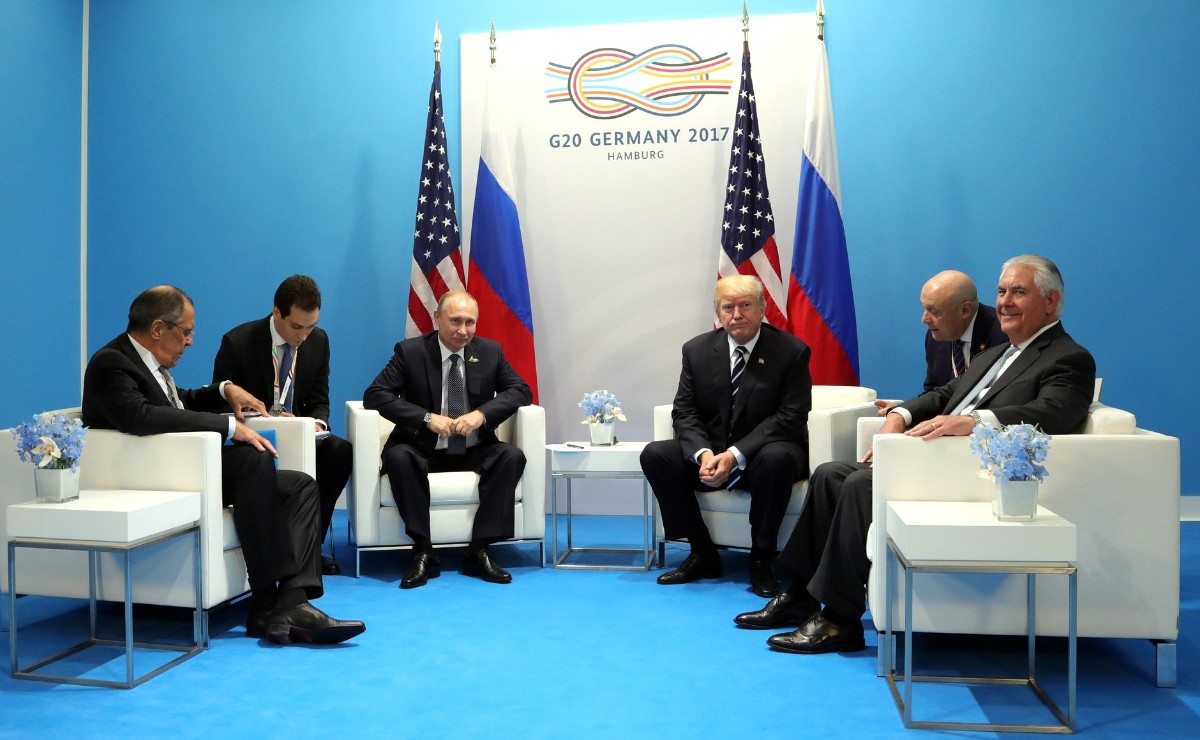 Photo courtesy of: Russian Presidential Executive Office
Photo courtesy of: Russian Presidential Executive Office
Deterring Russian Aggression: Compromise or Action?
Last week, President Trump tweeted that the U.S.’ relationship with Russia is worse than it has ever been, including during the Cold War. Though we are far from a Cuban Missile Crisis-style danger of mutual annihilation, rising tensions have led to recent events like tit-for-tat diplomat expulsions, new sanctions, and placing blame for cyberattacks. The United States and Russia had maintained a largely collaborative relationship since the end of the Cold War, despite newer strains. In past years, Russia has grown more hostile and aggressive on the world stage, partly due to the perceived threat from the West. This aggression has subsequently led the West to see Russia as threatening, resulting in a cyclical pattern of distrust.
After the Second World War, without the economic and structural damage suffered by Europe, the U.S. was a clear leader after the war ended. The United States invested significantly in Western Europe to help rebuild and to prevent another global economic crash. Conversely, the Soviet Union focused its economic development on states within the USSR, believing capitalist economies would eventually collapse. Due to the U.S.’ successes after WWII, and then the Cold War, its global influence today is inherent. Russia’s goal was, and still is, to be one of the world’s most influential states, but the failure of communism in the Soviet bloc, and political issues since then, have prevented Russia from fully achiveing this goal.
Though Russia is considered to be one of the world’s major powers, its aggressive nature is the foundation of its influence. Russia has the ability to block the goals and interests of the U.S. and achieve its own interests by using conventional or unconventional force. Otherwise, it is limited to specific industries it has significant control over, such as energy. Russia’s use of force can be seen in trying to maintain influence in Ukraine, as well as perpetuate Ukraine’s dependence on it, by using Russian forces to spark pro-Russia protests in Eastern Ukraine, annexing Crimea, and using cyberwarfare to attack power grids in 2015 and several infrastructures, both cyber and physical, in 2017. Though it is not a perfect comparison, these actions are similar to those taken to influence the United Sates.
Russia has used cyberattacks against the U.S., most infamously to influence the 2016 presidential elections. The Democratic National Committee servers were hacked and widespread social media campaigns were launched to spread false information and false news stories into mainstream media in an attempt to influence voters.
On March 16th, the Department of Homeland Security and the FBI released a report accusing Russia of cyberattacks on U.S. infrastructure, including energy, nuclear, water, and commercial facilities. This indicates that Russia has the ability to cause unprecedented harm to the United States without utilizing military might. In doing so, Russia is asserting its power, maybe adding to it, by taking actions that show it has significant capabilities beyond its military. The intelligence community has been aware of state-sponsored cyberattacks by Russia since 2015, but the attacks had primarily been focused on intelligence gathering. Prior to the 2016 presidential election, attacks became more frequent, more aggressive, and have shifted towards having the ability to sabotage or shut plants and facilities down.
President Trump has previously promised improved relations with Russia and has been hesitant to speak out against Putin’s government. Last July, Congress passed the Countering America’s Adversaries Through Sanctions Act, and new sanctions were set to be implemented in January on Russian companies and individuals for meddling in the 2016 election. Instead, the administration chose not to implement them, arguing that passing the act was acting as a deterrent on its own. Limited sanctions were later imposed in March, and further expanded on in April. Despite these actions of the administration, President Trump still shows reluctance in placing direct blame on Russia for the election meddling, contrasting conclusions drawn by the intelligence community.
Improving the U.S.’ relationship with Russia would involve offering Russia more influence and participation in areas of common interests to allow it to achieve its own strategic interests, which in some cases conflict with the United States’. There would need to be compromise from both parties in any scenario. For instance, one possibility with historic precedent could include allowing Russia more leeway in pursuing its foreign objectives in return for Russia improving democratic processes and personal freedoms. But due to the inherent difficulties in reaching this type of agreement, it is more realistic for the Trump administration to not only maintain current collaborations, but to finally join rhetoric and action against Russia’s aggression in order to deter future hostilities.






